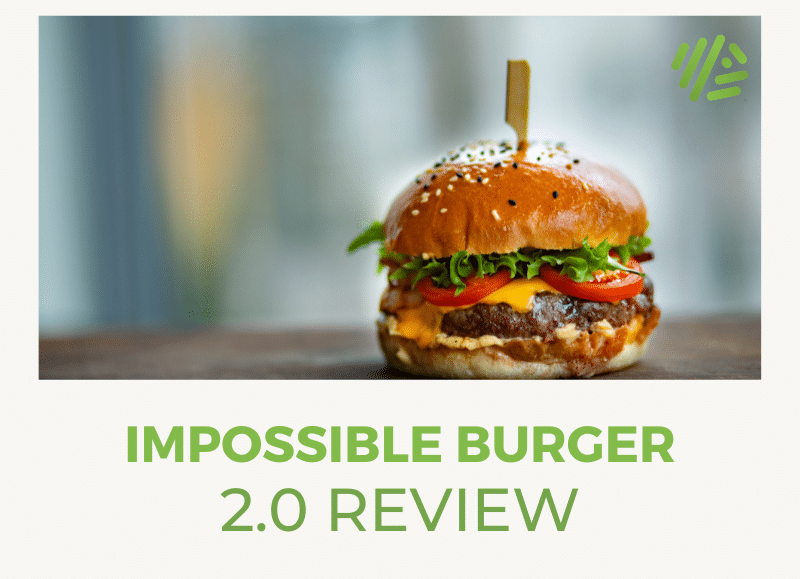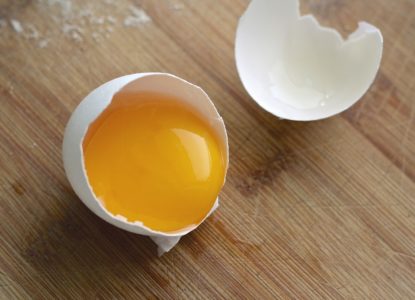Impossible Burger 2.0 Review

Contents
Update: the latest version of the Impossible Burger is now made gluten free without wheat, which is a welcome change. Thanks to our readers for bringing this to my attention.
The Impossible Burger is environmentally friendly, that much cannot be disputed. Raising cattle the way we do does real damage to our planet, and it has to stop, at least at its current trajectory. The industrial farming system is unsustainable, environmentally ruinous, and cruel to both animals and humans alike. Companies like Impossible Foods that create tasty plant based comfort food are badly needed.
However, Vegan junk food is an issue and just because it’s made of plants doesn’t mean it’s good for you.
Impossible burger designed to look like real burger
The Impossible Burger is designed to look and taste just like a real burger. This means the inventors were challenged to use plant matter to make a moist, “bloody” patty, with the same texture as real meat. To be fair, I must admit the Impossible Burger is reminiscent of a real burger, it has a texture and color that looks like ground beef. The aesthetic is impressive. The problem is that it uses ingredients that could be just as bad for some people’s health as eating a real burger every now and again.
In fact, there was some controversy as to whether the FDA would even approve the ingredient, called soy leghemoglobin, that makes the Impossible Burger “bleed.” Soy leghemoglobin releases a protein called heme which gives the burger it’s meat like traits.
Heme is not leghemoglobin
Is soy leghemoglobin safe? Very likely, yes.
The Impossible Burger team did feed unbelievable amounts of soy leghemoglobin to rats and found there were no adverse effects over a 28 day period.1
We don’t have studies in humans to see how people will react to the ingredients in the Impossible Burger.
It’s also worth noting that leghemoglobin, hemoglobin and myoglobin are not the same thing. They might all function to bind oxygen but they do all have a different structure. So, leghemoglobin is not the exact same molecule found in actual meat. They are similar but not identical.
Genetically modified microorganisms
According to this Wired Article, “one acre of soybeans yields just a kilogram of soy leghemoglobin,” so the Impossible Burger team created a workaround.
Wired does a good job of summing up the process:
Technicians take genes that code for the soy leghemoglobin protein and insert them into a species of yeast called Pichia pastoris. They then feed the modified yeast sugar and minerals, prompting it to grow and replicate and manufacture heme with a fraction of the footprint of field-grown soy.
And I do think this is an important distinction to make here. The Impossible Burger doesn’t just use genetically modified ingredients, it produces its key proteins using genetically modified microorganisms. I am not saying that is necessarily a bad thing, it may be a necessary thing in light of what animal agriculture is doing to the environment.
Impossible Burger Ingredients
Update: gluten is no longer an issue. The Impossible Burger 2.0 is now made without gluten.
Water, Soy Protein Concentrate, Coconut Oil, Sunflower Oil, Natural Flavors, 2 percent or less of: Potato Protein, Methylcellulose, Yeast Extract, Cultured Dextrose, Food Starch Modified, Soy Leghemoglobin, Salt, Soy Protein Isolate, Mixed Tocopherols (Vitamin E), Zinc Gluconate, Thiamine Hydrochloride (Vitamin B1), Sodium Ascorbate (Vitamin C), Niacin, Pyridoxine Hydrochloride (Vitamin B6), Riboflavin (Vitamin B2), Vitamin B12.




I appreciate the author’s analysis and explanation of the basic process in making these new food products. Seems like some do have allergic reactions to it, and I agree more FDA testing needs to be done.
But regardless, it is absolutely more environmentally sustainable to eat plant-based foods, whether they are healthy or not. The carbon footprint is provably smaller. So my view is that these burgers are not primarily for vegetarians or vegans, who possibly make these food choices for health or environmental reasons already. They are like methadone for heroin addicts, or maybe vapes for smokers: not necessarily healthy, but better than what they’ve been using. The reason these burgers should take over beef burgers should be thought of entirely in terms of global warming and animal welfare, not health.
The fact that these companies are creating demand through scarcity, and can make a profit while keeping the cost low is one of the best news stories for decarbonization I know of (and this is why my fear is that the beef industry is lobbying the Trump administration to pressure the FDA into ‘finding’ a problem with it…)
Eek. I bet you wear a pussycat and March for science yet can understand the basics of biological engineering.
While you’re at it, might as well condemn modern insulin which is manufactured by GMO e coli.
To think you have an audience that listens to your ignorant opinions.
I just had the impossible burger last weekend and I started breaking out in hives, my face started swelling, my tongue also started swelling… thankfully I took benadryl which helped everything go down by the next day but a friend of mine told me someone had an allergic reaction and had to go to the hospital… I’ve only had two major allergic reactions in my life and the first time was because of another veggie burger, so im not sure whats in it that made me react again, but definitely be aware of potential reactions.
“Environmentally friendly” is quite debatable. Properly managed range lands for cattle sequester tremendous amounts of carbon dioxide. Getting rid of cattle may actually cause more harm than good.
This is incorrect. Each step up from photosynthesis in the food chain requires more energy, simply because of the second law of thermodynamics. In terms of meat production, this translates into needing for more grain to grow a cow and then eat the cow than one would need eating the grain directly. Of all meats, eating beef is the single highest contributor to CO2 emissions, per pound of meat, because: (1) cows have a long gestation period and produce one calf at a time, (2) they require a huge amount of land, (3) we make inefficient use of the products of each animal. In addition, their burps produce an enormous flux of methane, which is a powerful greenhouse gas. Even in the case of small farms using sustainable practices, the net production of carbon will be greater growing cows than if the same grain is used to feed people. If you have a paper to cite regarding the claim that well-managed range lands sequester all the carbon produced, please cite it.
I’ve been vegetarian for 11 years and I try to implement a vegan diet at least a couple times a week. The first time I tried the Impossible Burger (and this MIGHT be TMI for some of you) but I could NOT stop pooping for like a full 24 hours after I ate it. And relatively normal craps too, like the same type of sh*t you get when you eat too much spinach or consume too much iron. Has anyone else experienced this? AM I CRAZY?
Its not too much, same thing happens to me, guess my body is trying to tell me its not good for me.
The cry babies on here crack me up… Bunch of pussies.. but eat literally ass and stomach and animal guts.. stupid ass people and there life of living.
All part of agenda 21. Dont eat this genetic crap. Eat foods from nature and animals.
Very thorough review. I found your article while searching to find out more about Impossible’s “secret” ingredient(s). I agree- this lab-created food product is a far cry from being a whole plant food. Therefore, I refuse to eat it and I won’t be surprised when more health issues arise from its consumption over time. By the way, my daughter ended up in ER after eating an Impossible burger, so No Thanks food scientists👎.
Not natural. Not good. Nothing wrong with animals. They are not bad for you or the environment. Corporate junk science use to created mega farms with genetically alterered, lab created 0lants with high yield and no cost. It’s all about the money as usual. Science will justify anything for money.
The effect of impossible or beyond burgers on people is debatable, I agree. But that it is more environmentally friendly is not – it is absolutely a lower carbon footprint than any form of meat.
I’m a meat eater, despite this – I think of these products as like methodone for a heroin addict.
Thanks!
I also recommend not to try the incredible burger from garden gourmet (aka. nestle)
This thing gave me the hardcore allergic experience of a lifetime and i did not have any issues with allergies regarding any food in the past.
Why is it called Impossible? What’s so impossible about it? Is it impossible to eat it? Is it something people thought once impossible to create? Who canme up with that name?
OK, using words like “gross” are not the best representation of objectivity in this blogcicle, but there was nothing factually incorrect about the information presented. I was surprised at the vitriol of the GMO loving, armchair scientists.
I ate an impossible burger, and I also read the list of ingredients that the proprietor of the restaurant provided when I asked. As one who has several years of university upper level coursework in cell bio, organic chem, biochem,, animal science, meat science and food science, I am not much alarmed at eating the leghemoglobin by-product of a GMO yeast. Compared to GMOs like roundup resistant crop seeds, it’s a “nothing burger,” (Sorry for the pun). But methyl cellulose, an important binder component of the I-Burger, has a strong likelihood of disrupting healthy gut bacteria populations. Eating dissolved wood products is not exactly natural for humans, and has potential to create an unhealthy gut microbe population. For those of us who want to reduce our water and carbon consumption and so seek to reduce meat consumption, what’s wrong with a goddamn actual, organic, natural veggie burger? The things people waste their time on (making fake meat) is what’s truly mind boggling.
Biased much? Soyleghemoglobin is the hemoglobin found in soy. Stick to something you understand, which isn’t biology, chemistry or anything remotely related to science.
If a plant makes it, eat it.
If it is made in a plant, don’t eat it.
Really? Please go back to school because you don’t understand basic science.
John,
You should update this page to reflect the current facts. Although the original Impossible Burger was not gluten free, the Impossible 2.0 burger, which has now totally replaced the original as of April 2019 is gluten free.
Also, to address the concern from CG above, although it contains coconut oil, it is safe for those with nut allergies due to the refining process of the oil.
More explanation from the source here: https://faq.impossiblefoods.com/hc/en-us/articles/360018937694-What-allergens-does-it-contain-
Christian, thanks for the heads up. Post has been updated.
Forget the gluten. This product has tree nuts in it as well. Any burger place that carries it is now a no-go for me due to cross-contamination. This will now include Burger King and Carl’s Jr. and I hope more don’t pick this up.
This is typical misunderstanding and misrepresentation of science by someone not trained in science. This is a serious and depressing problem: average people trying to research things on the internet will mostly encounter articles written by people (like this author) who have no formal education in molecular biology and therefore can’t offer a scientific justification for the things they’re writing about.
He calls the ingredients gross twice, his argument for them being “gross” rely on two things: some people are allergic to those ingredients, and the genetic engineering aspect.
For the first argument, to think something is gross or bad just because a tiny fraction of the population is allergic to it is simply ridiculous and I don’t think I need to spend any time arguing that. Peanuts are obviously perfectly fine for the vast majority of people, are they “gross” just because some tiny percent of people are allergic to them?
Genetic engineering: once you learn how DNA works in the cell and how every now and then as you read down a genome there exists a gene, which can be transcribed to RNA and then translated to amino acids which are folded into a protein, you’ll realize that no step along the way is this process “gross” just because the chunk of DNA that this process started from was originally (as in thousands of generations ago) inserted there by a scientist instead of arriving through genetic mutation or a mating process. Plants evolve certain traits, i.e. certain chunks of DNA that for example make them resistant to some bug (and therefore not need a pesticide to treat it). Is it “gross” that humans purposefully breed that plant to introduce the gene to future generations? Is it “gross” when a virus inserts that gene? What about if the virus was put there by a human, is it only gross because the human got involved? If so, what is the scientific justification for why that is gross?
GMO is an excellent solution to global warming, sustainable farming, and ending poverty, but you have people like this author who are 100% comparable to other anti-science groups like anti-vaxxers or global warming deniers who only attempt to hold humanity back due to being poorly educated but sadly, loud and possibly influential.
Oddly, not much of what you write about modifying Genes in a petri dish, or under special bio-chemical processes invented by people is precisely how nature modifies Genes. Your argument James, is based on a high-school view of genetics. Imagine if biology was mathematics.
It isn’t, and if you took a leap to pretend it was, the kind of math biology is close to is statistics and approximation. There is no singular, 100% relationship between a Gene and an outcome, or expression of the Gene. As it turns out, *science* has learned that Genetic expression is controlled by more than a Gene. It could be a chorus of gene, and other bio-components. Every month, there’s a new discovery. As you point out, there are left-over genetic materials from other life forms in the DNA of other life.
Yet, suddenly, everyone is a bio-engineering expert, returned from the future, when gene-edited life forms have proven out, over generations, they are safe. Biology is very messy. Much more messy than physics or math, and at the edge of those sciences, ‘approximation and probability’ rule, not determinism and absolute results.
” James
April 29, 2019 at 2:36 pm
This is typical misunderstanding and misrepresentation of science by someone not trained in science. This is a serious and depressing problem: average people trying to research…… ”
Zzzzzzzzz
You wrote a lot of irrelevant crap boy.
Well said
Fucking idiot. The uneducated cunt (the author) can’t make these baseless claims and guesses, and jump to wild conclusions like this. Probably paid off by the meat farming industry to write this article. Dumbass.
I thought these messages were moderated? I agree that the author’s analysis is imperfect, but you degenerate the conversation by cursing.
-A scientist.
Well if GMO soy protein scares ya, definitely DON’T do a street view search of their facility and notice the most unusually located planned parenthood right across the street. Enjoy those stem cells! Yum!
truthisugly — You’re an idiot.
It seems everyone is missing a more important point. Weeds were becoming resistant to glyphosate (an herbicide not a pesticide). But, by increasing the concentration of glyphosate, the crops also began to die. Now comes the tricky part. GMO’s were created so they could survive the higher concentration of glyphosate needed to kill the weeds. To make matters worse, most commercial farms spray an even higher concentration on some crops to kill them just before they are harvested so they have a uniform moisture content. Even though Monsanto, now Bayer, lies & the FDA swears to it, glyphosate does not biodegrade completely and is being found in most nonorganic foods. So until the Impossible Burger is tested for glyphosate, by a reliable third party laboratory, I will restrain myself and continue to eat only organically grown foods.
Your comment is extremely enlightening. Apparently I am not getting all the information I need by reading the ingredients listed on food packaging. How do I access the information that you provided regarding glyphosphates and GMOs?
Thanks
You are right on to what is happening. I’ve started growing most of what we eat. We are done with red meat, chicken, pork. We do eat fish from cold water Alaska, etc. I have just about stopped eating dairy. I don’t know where we are going as a nation but the GMO’s etc. are going to cause the entire world to become sterile.